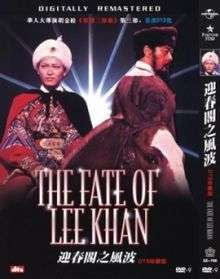The Fate of Lee Khan
| The Fate of Lee Khan (original title: Ying chun ge zhi Fengbo) | |
|---|---|
 | |
| Directed by | King Hu |
| Written by |
King Hu Chung Wang |
| Starring |
Li Li-Hua Roy Chiao Feng Hsu Ying Bai Feng Tien Angela Mao |
| Cinematography | Tsing-Can Chun |
| Edited by | King Hu |
Production company | |
Running time | 105 min. |
| Country | Hong Kong |
| Language | Mandarin |
The Fate of Lee Khan is a 1973 Hong Kong wuxia film, directed by King Hu.[1]
Plot
In the film, Wendy is a resistance fighter of the Chinese underground who wants to stop Lee Khan from attaining an important map. All of the resistance fighters want to restore Han rule. The villains are Lee Khan and his female partner Wan’er, who want to prevent the resistance fighters achieving victory.[1]
Cast
- Li Li-Hua as Wan Jen-mi
- Roy Chiao as Tsao Yu-kun
- Feng Hsu as Lee Wan-erh
- Ying Bai as Wang Shih Cheng (as Pai Ying)
- Feng Tien as Lee Khan (as Feng Tian)
- Angela Mao as Hai Mu-tan (as Mao Ying)
- Chin Hu as Shui Mi-tao
- Helen Ma as Yeh Li-Hsiang
- Nan Chiang as Liu San-Hu
- Ying-Chieh Han as Sha Yuan Shan
- Chia-hsiang Wu as Tavern manager Liu
Analysis
The film is one of the Chinese action films that helped encourage that there be more female action roles.[2]
The director King Hu used methods of framing to show action scenes in detail. Close to the end of the film, the director used cutting patterns and edge framing to show how similar all of the fighters' moves are.[3] Hu also filmed The Fate of Lee Khan back to back with The Valiant Ones.[1]
Releases
Titled Ying chun ge zhi Fengbo in its original Taiwan release, the film has had subsequent releases under other titles. It was as Der letzte Kampf des Lee Khan in Germany, as L'auberge du printemps in France, and as Ying chung gok ji fung boh when released in Cantonese in Hong Kong.
References
- 1 2 3 Stephen Teo. "King Hu's The Fate of Lee Khan and The Valiant Ones". Sense of Cinema. Retrieved December 27, 2011.
- ↑ Billson, Anne; British Film Institute (2005). Buffy the vampire slayer. Macmillan. p. 12. ISBN 978-1-84457-089-8.
- ↑ Fu, Poshek; David Desser (2002). The Cinema of Hong Kong: History, Arts, Identity. Cambridge University Press. p. 22. ISBN 978-0-521-77602-8. Retrieved December 27, 2011.